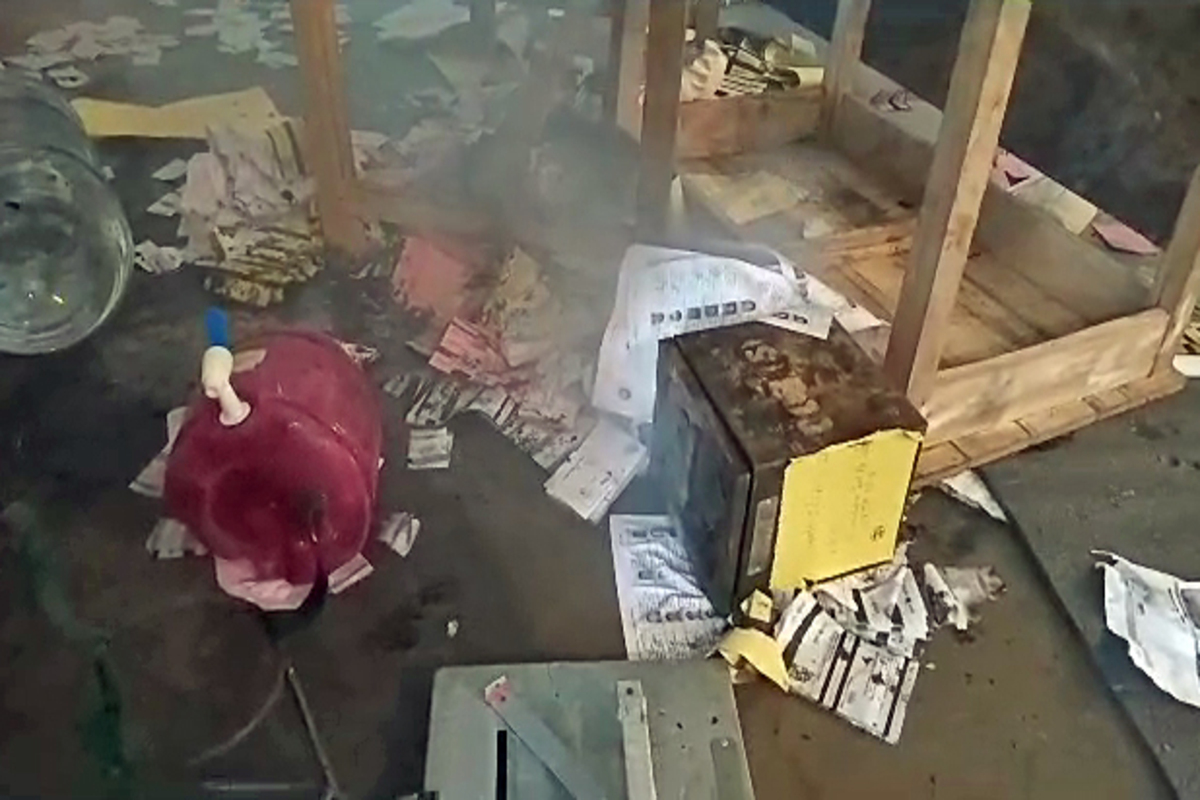TMC blames BJP for explosion, violence
Violence erupted again at Rejinagar in Murshidabad district on Wednesday evening, injuring around 20 people.
Hospitals in the rural districts were photographed with people languishing in various states of injury, bleeding, bandaged.

West Bengal, in Cooch Behar on Saturday. (ANI Photo)
Bombs, daggers, guns, rods – these are not weapons one associates with the democratic process of elections. Unfortunately the rural polls of West Bengal witnessed the use of all of the above and more. By five in the afternoon, when voting was completed as per schedule, at least twelve people were killed. Television news cameras captured shots of dead bodies lying outside polling booths before being carried off in stretchers. Bombs exploded killing people, injuring others. Hospitals in the rural districts were photographed with people languishing in various states of injury, bleeding, bandaged.
Of the dead, there were supporters of all the major political parties – Trinamool, BJP, Congress and CPIM. But which political party perpetrated the violence is not important. The fact that elections taking place in a state in a democratic country is witnessing violence of this magnitude, reflective of combat battles is the shocking part. Prof Biswanath Chakraborty, political analyst and sephologist had expressed grave concern about accepting the verdict of the last Panchayat Polls held five years ago in 2018, which reported unprecedented violence. This time he called it a virtual “genocide”.
The dead included those who died of bomb blast injuries. One was stabbed to death. One was beaten to death. One was shot dead. The injured include supporters of different political parties, election workers, presiding officers manning the booths and even voters. Goons, allegedly protected by political parties, pranced around brandishing guns and rods. They had their heads and faces covered with gamchas (thin, cotton towels). Some brazenly “captured” booths and confiscated the ballot boxes proceeding to stamp on the same symbol one by one. Some even defiantly looked at rolling news cameras as if to ask, “What are you going to do about it?” Ballot boxes were also stolen, vandalized, burned down, doused in water. In some cases angry mobs, including women from the villages, incensed that their votes had been “stolen” and “captured”, carried them away and threw them into ponds and other water bodies.
Advertisement
The different areas from which reports of violence emerged were, among others, Baduria, Basanti, Bhangar, Cooch Behar, Uttar Dinajpur, Dinhata, Domjur, Domkol, Katua, Keshpur, Lalgola, Murshidabad, Sheuri.
A day before the rural polls, Diamond Harobor villagers claimed that the poll process is usually largely “peaceful.” Today as violence ripped through different parts of the state, they once again expressed that they managed to conduct the elections peacefully. “There was no violence in these parts,” said Mounobroto Panja, a young man of Bishnupur village, who keeps tabs on the polling process in other places. He did, however, noted that there were a scuffle or two in some areas but it got amicably settled. “But usually intimidation of rival candidates or voters is not done or accepted here,” he says.
In fact, the fisticuffs and scuffles are considered more innocuous forms of violence compared to throwing bombs or gunshots and incidents of presiding officers being punched and kicked have been reported.
Polling officers have often expressed helpless, not to mention fear, when they are assigned the polling duty. A retired government official who had been assigned polling duties several times during his tenure told The Statesman, “One of the best parts of having retired is that I no longer have to attend to poll duty.”
Violence continued to be reported past 5. Political parties have started the blame game. Sources in Trinamool claimed that “There was a systematic attempt to create trouble in Bengal with the intention of defaming the state.” In a press conference, Trinamool leader Shashi Panja said, that in thirteen to fourteen booths polling was peaceful and conducted successfully. She said that out of 69,539 booths, 60 booths reported some incidents out of which only 8 or 9 fell into the serious category. She also lamented that workers, irrespective of which political party they belonged to, had to lose their lives.
Leader of Opposition, BJP’s Suvendu Adhikari declared that a protest march ought to reach Kalighat, a reference to West Bengal chief minister Mamata Banerjee’s residence there.
Advertisement